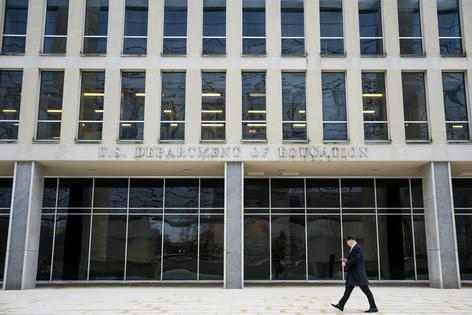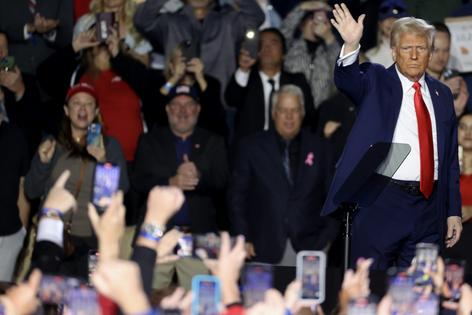Why does Trump want to abolish the Education Department? An anthropologist who studies MAGA explains 4 reasons
Published in Political News
“And one other thing I’ll be doing very early in the administration is closing up the Department of Education.”
President Donald Trump made this promise in a Sept. 13, 2023, campaign statement. Since then, he has frequently repeated his pledge to close the U.S. Department of Education.
Project 2025, the conservative think tank Heritage Foundation’s blueprint for the Trump administration, also provides detailed recommendations for closing the Education Department, which was created by an act of Congress in 1979.
On Feb. 4, 2025, Trump described his plans for Linda McMahon, his nominee for education secretary. “I want Linda to put herself out of a job,” Trump said, according to The Associated Press.
I am an anthropologist and have been studying U.S. political culture for years. During Trump’s first presidency, I wrote a book about the extremist far-right called “It Can Happen Here”. Since then, I have continued to study the Make America Great Again, or MAGA, movement, seeking to understand it, as the anthropological expression goes, “from the native’s point of view.”
Education policies in the U.S. are largely carried out at the state and local levels. The Education Department is a relatively small government agency, with just over 4,000 employees and a US$268 billion annual budget. A large part of its work is overseeing $1.6 trillion in federal student loans as well as grants for K-12 schools.
And it ensures that public schools comply with federal laws that protect vulnerable students, like those with disabilities.
Why, then, does Trump want to eliminate the department?
A will to fight against so-called “wokeness” and a desire to shrink the government are among the four reasons I have found.
First and foremost, Trump and his supporters believe that liberals are ruining public education by instituting what they call a “radical woke agenda” that they say prioritizes identity politics and politically correct groupthink at the expense of the free speech of those, like many conservatives, who have different views.
Diversity, equity and inclusion, or DEI, initiatives promoting social justice – and critical race theory, or the idea that racism is entrenched in social and legal institutions – are a particular focus of MAGA ire.
So, too, is what Trump supporters call “radical gender ideology,” which they contend promotes policies like letting transgender students play on school sports teams or use bathrooms corresponding with their gender identity, not biological sex.
Trump supporters say that such policies – which the Education Department indirectly supported by expanding Title IX gender protections in 2024 to include discrimination based on gender identity – are at odds with parental school choice rights or, for some religious conservatives, the Bible.
Race and gender policies are highlighted in Project 2025 and in the 2024 GOP’s “Make America Great Again!” party platform.
Trump has repeatedly promised, as he did on Aug. 14, 2024, in North Carolina, to “keep critical race theory and transgender insanity the hell out of our schools.”
On Jan. 20, 2025, Trump signed executive orders targeting “gender ideology extremism” and “radical” DEI policies. Two weeks later, he signed another one on “Keeping Men Out Of Women’s Sports.
For MAGA supporters, ”radical left“ wokeness is part of liberals’ long-standing attempt to ”brainwash“ others with their allegedly Marxist views that embrace communism.
One version of this ”American Marxism“ conspiracy theory argues that the indoctrination dates to the origins of U.S. public education. MAGA stalwarts say this alleged leftist agenda is anti-democratic and anti-Christian.
Saying he wants to combat the educational influence of such radicals, zealots and Marxists, Trump issued executive orders on Jan. 29 that pledge to fight ”campus anti-Semitism“ and to end ”Radical Indoctrination in K-12 Schools.“
Trump supporters also argue that "woke” federal public education policy infringes on people’s basic freedoms and rights.
This idea extends to what Trump supporters call “restoring parental rights,” including the right to decide whether a child undergoes a gender transition or learns about nonbinary gender identity at public schools.
The first paragraph of Project 2025’s chapter on education argues, “Families and students should be free to choose from a diverse set of school options and learning environments.”
Diversity, according to this argument, should include faith-based institutions and homeschooling. Project 2025 proposes that the government could support parents who choose to homeschool or put their kids in a religious primary school by providing Educational Savings Accounts and school vouchers. Vouchers give public funding for students to attend private schools and have been expanding in use in recent years.
Critics of school vouchers, like the National Education Association and American Federation of Teachers unions, argue that vouchers would diminish public education for vulnerable students by taking away scarce funding.
Trump has already issued a Jan. 29 executive order called “Expanding Educational Freedom and Educational Opportunity for Families,” which opens the door to expanded use of vouchers. This directly echoes Project 2025 by directing the Education Department to prioritize educational choice to give families a range of options.
For the MAGA faithful, the Education Department exemplifies government inefficiency and red tape.
Project 2025, for example, contends that from the time it was established by the Carter administration in 1979, the Education Department has ballooned in size, come under the sway of special interest groups and now serves as an inefficient “one-stop shop for the woke education cartel.”
To deal with the Education Department’s “bloat” and “suffocating bureaucratic red tape,” Project 2025 recommends shifting all of the department’s federal programs and money to other agencies and the states.
These recommendations dovetail with Trump’s broader attempt to eliminate what he and his MAGA supporters consider wasteful spending and deregulate the government.
Trump signed an executive order on Jan. 20 that establishes a “Department of Government Efficiency” headed by billionaire Elon Musk. Musk said on Feb. 4 that Trump “will succeed” in dismantling the Education Department.
At first glance, the Education Department’s days might seem numbered given Trump’s repeated promises to eliminate it and his reported plans to soon sign an executive order that does so. Republican Senator Mike Rounds of South Dakota also introduced a bill in November 2024 to close the department.
And Trump has taken actions, such as seeking to shut down the U.S. Agency for International Development without the required congressional approval, which suggest he may try to act on his Education Department promises.
Abolishing the department, however, would legally require congressional approval and 60 votes to move forward in the Senate, which is unlikely since Republicans only have 53 seats.
Trump also made similar promises in 2016 that were unfulfilled. And Trump’s executive actions are likely to face legal challenges – like a DEI-focused higher education lawsuit filed on Feb. 3.
Regardless of such legal challenges, Trump’s executive orders related to education demonstrate that he is already attempting to “drain the swamp” – starting with the Education Department.
This article is republished from The Conversation, a nonprofit, independent news organization bringing you facts and trustworthy analysis to help you make sense of our complex world. It was written by: Alex Hinton, Rutgers University - Newark
Read more:
Trump’s administration seems chaotic, but he’s drawing directly from Project 2025 playbook
Why Trump’s rage defies historical and literary comparisons, according to a classics expert
Trump’s Project 2025 agenda caps decades-long resistance to 20th century progressive reform
Alex Hinton receives funding from the Rutgers-Newark Sheila Y. Oliver Center for Politics and Race in America, Rutgers Research Council, and Henry Frank Guggenheim Foundation.




























































Comments